FINDING THE AREA OF A RHOMBUS
The area of a rhombus is half of the product of the lengths of its diagonals.
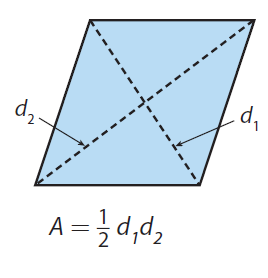
Relationship between Rhombus and Rectangle
A rhombus is a quadrilateral in which all sides are congruent and opposite sides are parallel. A rhombus can be divided into four right triangles that can then be rearranged into a rectangle.
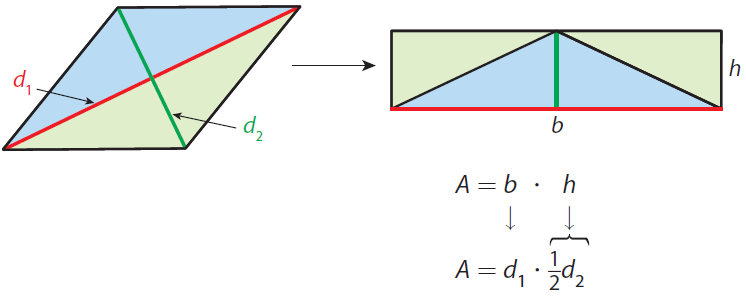
The base of the rectangle is the same length as one of the diagonals of the rhombus. The height of the rectangle is half the length of the other diagonal.
Problem 1 :
Cedric is constructing a kite in the shape of a rhombus. The spars of the kite measure 15 inches and 24 inches. How much fabric will Cedric need for the kite ?
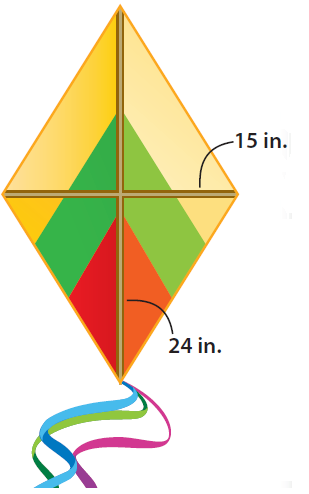
Solution :
To determine the amount of fabric needed, find the area of the kite.
Formula for area of a rhombus :
= 1/2 ⋅ (d1d2)
Substitute 24 for d1 and 15 for d2.
= 1/2 ⋅ (24 ⋅ 15)
= 12 ⋅ 15
= 180 in2
So, Cedric needs 180 square inches of fabric to make the kite.
Problem 2 :
A kite in the shape of a rhombus has diagonals that are 25 inches long and 15 inches long. What is the area of the kite?
Solution :
Formula for area of a rhombus :
= 1/2 ⋅ (d1d2)
Substitute 25 for d1 and 15 for d2.
= 1/2 ⋅ (25 ⋅ 15)
= 1/2 ⋅ (375)
= 187.5 in2
Problem 3 :
The diagonals of a rhombus are 12 in. and 16 in. long. The length of a side of the rhombus is 10 in. What is the height of the rhombus ?
Solution :
Formula for area of a rhombus :
= 1/2 ⋅ (d1d2)
Substitute 12 for d1 and 16 for d2.
= 1/2 ⋅ (12 ⋅ 16)
= 6 ⋅ 16
= 96 in2
Because rhombus is a parallelogram, we can use the formula for area of a parallelogram to find the height of the rhombus.
Area of parallelogram = 96 in2
base x height = 96
Substitute 10 for base.
10 x h = 96
Divide each side by 10.
height = 9.6 inches
Problem 4 :
The area of a rhombus is 150 cm2. The length of one of its diagonals is 10 cm. The length of the other diagonal is :
a) 25 cm b) 30 cm c) 35 cm d) 40 cm
Solution :
Area of rhombus = 150 cm2
Diagonal = 10 cm
Let x be the length of the other diagonal.
1/2 ⋅ (10 ⋅ x) = 150
5x = 150
x = 150/5
x = 30
So, the length of the other diagonal is 30 cm, option b is correct.
Problem 5 :
If the diagonals of a rhombus are 24 cm and 10 cm, the area and perimeter of the rhombus are respectively,
a) 120 cm2, 52 cm b) 120 cm2, 64 cm
c) 240 cm2, 52 cm d) 240 cm2, 64 cm
Solution :
Area of rhombus = 1/2 ⋅ (d1d2)
= (1/2) (24 x 10)
= 120 cm2
Diagonals will bisect each other at right angle.
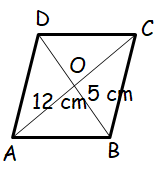
In triangle AOB,
AB2 = AO2 + OB2
AB2 = 122 + 52
= 144 + 25
= 169
AB = √169
AB = 13
Perimeter of rhombus = 4AB
= 4(13)
= 52 cm
So, the area of rhombus is 120 cm2, 52 cm.
Problem 6 :
Each side of the rhombus are 26 cm and one of its diagonals is 48 cm long. The area of rhombus is :
a) 240 cm2 b) 300 cm2 c) 360 cm2 d) 480 cm2
Solution :
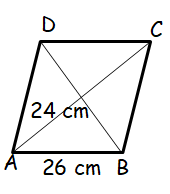
Let x be the half of the length of diagonal.
262 = 242 + x2
676 = 576 + x2
676 - 576 = x2
x2 = 100
x = √100
x = 10 cm
Length of diagonal = 2(10) ==> 20 cm
Area of rhombus = (1/2) (48 x 20)
= 24 x 20
0= 480 cm2
So, option d is correct.
Problem 7 :
If the diagonals of a rhombus of side 15 cm are in the ratio 3 : 4, find the area of the rhombus.
a) 54 sq.cm b) 108 sq.cm c) 144 sq.cm
d) 216 sq.cm e) none
Solution :
Side length of rhombus = 15 cm
Diagonals are in the ratio of 3 : 4
Diagonals = 3x and 4x
(3x/2)2 + (2x)2 = 152
(9x2/4) + 4x2 = 225
(9x2 + 16x2)/4 = 225
25x2/4 = 225
x2 = 225(4/25)
x2 = 9(4)
x = 6
3x = 3(6) ==> 18 cm
4x = 4(6) ==> 24 cm
So, the diagonals are 18 cm and 24 cm
Area of rhombus = (1/2) (18 x 24)
= 9(24)
= 216 sq.cm
So, option d is correct.
Problem 8 :
PQRS is a rhombus perimeter is 32 cm and interior angle QRS = 120. What is the area of the rhombus PQRS ?
Solution :
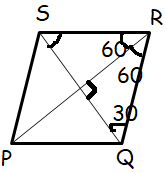
Perimeter of rhombus = 32
4a = 32
a = 32/4
a = 8
Using the concept of special right triangle,
Side opposite to 90 degree = 2(smallest side)
Let x be the side opposite to 30 degree.
2x = 8
x = 4
side opposite to 30 degree = 4
Side opposite to 60 degree = 4√3
Length of diagonal 1 = 2(4) ==> 8
Length of diagonal 2 = 2(4√3) ==> 8√3
Area of rhombus = (1/2) (8 x 8√3)
= 32√3 cm2
Kindly mail your feedback to v4formath@gmail.com
We always appreciate your feedback.
©All rights reserved. onlinemath4all.com
Recent Articles
-
Digital SAT Math Problems and Solutions (Part - 150)
Apr 25, 25 11:46 AM
Digital SAT Math Problems and Solutions (Part - 150) -
AP Calculus AB Problems with Solutions (Part - 19)
Apr 24, 25 11:10 PM
AP Calculus AB Problems with Solutions (Part - 19) -
AP Calculus AB Problems with Solutions (Part - 18)
Apr 24, 25 11:06 PM
AP Calculus AB Problems with Solutions (Part - 18)
